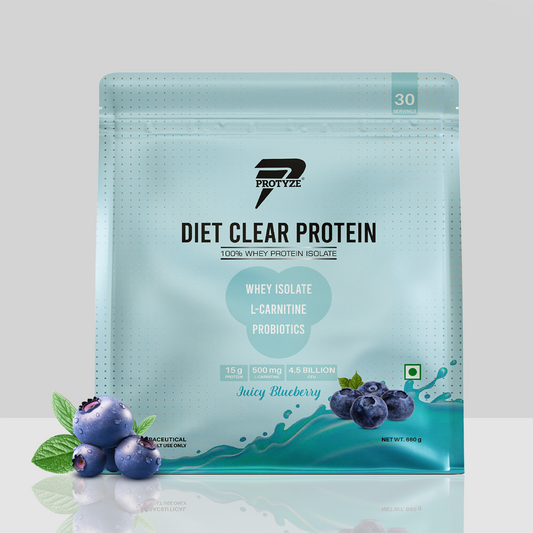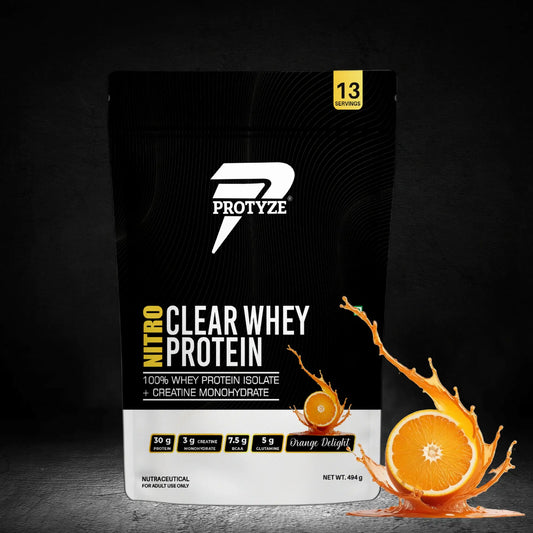Protein is often called the building block of muscle, and for good reason—it plays a crucial role in repairing and growing muscle tissue, especially after a workout. You’ve probably heard that consuming protein soon after exercise is essential for recovery, but what happens if you skip it? Does it really make a difference, or is the timing of protein intake overrated?
This blog explores the effects of skipping protein after a workout, why protein timing matters, how it impacts your fitness goals, and what you can do to optimize recovery. We’ll also highlight Protyze Nitro Clear Whey Protein, a high-protein, creatine-enhanced supplement with flavors like Sour Apple Candy, to support your post-workout needs. Whether you’re lifting weights, running, or doing yoga, understanding the role of protein can help you maximize your results and feel your best.
Why Protein After a Workout Matters
When you exercise, especially during strength training or high-intensity activities, your muscles undergo stress. Tiny tears form in the muscle fibers, and your body uses protein to repair and rebuild these fibers, making them stronger and larger over time—a process called muscle protein synthesis (MPS). Here’s why consuming protein after a workout is so important:
- Boosts Muscle Protein Synthesis: After exercise, your body is primed to use protein to repair muscle damage. Consuming protein within a few hours provides the amino acids (like leucine) needed to kickstart MPS, helping your muscles recover and grow.
- Reduces Muscle Breakdown: Exercise can also increase muscle protein breakdown (MPB). Protein helps balance this by providing amino acids to rebuild muscle, preventing excessive loss of muscle mass.
- Replenishes Energy Stores: If your workout depletes glycogen (stored carbs in your muscles), pairing protein with carbs can help restore these energy reserves, preparing you for your next session.
- Supports Overall Recovery: Protein aids in reducing muscle soreness (delayed onset muscle soreness, or DOMS) and speeds up recovery, so you can train again sooner without feeling overly fatigued.
- Enhances Strength and Performance: Over time, consistent protein intake post-workout supports muscle growth and strength gains, helping you lift heavier, run faster, or perform better in your chosen activity.
The “anabolic window”—the idea that you must consume protein within 30-60 minutes after a workout—has been debated. While timing is important, the overall protein you consume throughout the day matters more. However, skipping protein entirely after a workout can still have noticeable effects, especially if it becomes a habit.
What Happens If You Skip Protein After a Workout?
Skipping protein after a workout doesn’t mean your muscles will disappear overnight, but it can impact your recovery, performance, and long-term fitness goals. Here’s what might happen:
1. Slower Muscle Recovery
Without protein, your body lacks the amino acids needed to repair muscle damage efficiently. This can lead to:
- Increased Soreness: You might feel more DOMS because your muscles aren’t rebuilding as quickly, making you feel stiff or achy for longer.
- Longer Recovery Time: Without adequate protein, it takes longer for your muscles to heal, which can delay your next workout and disrupt your training schedule.
- Fatigue: Your body might pull amino acids from other muscles to repair the damaged ones, leading to overall tiredness and reduced energy for daily activities.
2. Reduced Muscle Growth
If your goal is to build muscle (hypertrophy), skipping protein post-workout can hinder progress:
- Missed Anabolic Opportunity: Post-workout, your body is highly sensitive to protein, and MPS is elevated. Skipping protein means you’re not fully capitalizing on this window, potentially slowing muscle growth.
- Imbalanced Protein Synthesis: Without enough protein, muscle protein breakdown might outpace synthesis, leading to a net loss of muscle over time, especially if you train hard regularly.
- Plateau in Strength Gains: If your muscles aren’t recovering and growing optimally, you might notice slower improvements in strength, making it harder to lift heavier weights or increase reps.
3. Increased Hunger and Cravings
Protein helps with satiety, keeping you full and satisfied. Skipping it after a workout can affect your appetite:
- Hunger Spikes: Without protein, you might feel hungrier sooner, leading to overeating or reaching for unhealthy snacks like chips or sweets.
- Blood Sugar Swings: Pairing protein with carbs post-workout helps stabilize blood sugar. Skipping protein might cause energy crashes, making you feel sluggish or irritable.
- Risk of Overeating Later: If you’re starving a few hours after your workout, you might eat more than you need, which can interfere with weight management goals.
4. Potential Loss of Muscle Mass
While a single missed protein opportunity won’t cause muscle loss, consistently skipping protein after workouts can:
- Catabolic State: Without enough protein, your body might break down muscle tissue for energy, especially if you’re training in a fasted state or not eating enough overall.
- Reduced Gains Over Time: If you’re not meeting your daily protein needs, skipping post-workout protein can contribute to muscle loss, particularly for those aiming to maintain or build muscle mass.
- Impact on Metabolism: Muscle mass supports a higher metabolic rate. Losing muscle over time can slow your metabolism, making it harder to burn calories and maintain a healthy weight.
5. Weaker Performance in Future Workouts
Your next workout depends on how well you recover from the current one. Skipping protein can:
- Lower Energy Levels: Without proper recovery, you might feel less energetic for your next session, leading to weaker lifts, slower runs, or less endurance.
- Reduced Strength: If your muscles aren’t repairing fully, you might struggle to perform at your best, impacting your overall progress.
- Increased Injury Risk: Poor recovery can lead to overtraining or fatigue, raising the risk of strains, sprains, or other injuries during exercise.
6. Missed Benefits for Endurance Athletes
For endurance athletes (like runners or cyclists), protein post-workout is just as important:
- Delayed Glycogen Replenishment: Protein helps shuttle carbs into your muscles to restore glycogen. Skipping it can slow this process, leaving you less fueled for your next long run or ride.
- Muscle Fatigue: Endurance activities break down muscle protein too. Without post-workout protein, you might experience more fatigue and slower recovery, affecting your training consistency.
In summary, skipping protein after a workout can lead to slower recovery, reduced muscle growth, increased hunger, and weaker performance over time. While the occasional skip won’t derail your progress, making it a habit can hinder your fitness goals, whether you’re aiming for muscle gain, endurance, or overall health.
How Much Protein Do You Need Post-Workout?
The amount of protein you need after a workout depends on your body weight, activity level, and goals. Here are some general guidelines:
- General Recommendation: Aim for 20-40g of protein within 1-2 hours after exercise to maximize muscle protein synthesis.
- Per Body Weight: A more precise target is 0.25-0.4g of protein per kg of body weight (15-24g for a 60kg person, 20-32g for an 80kg person).
- Endurance Athletes: 15-25g of protein paired with 0.8-1g/kg of carbs (e.g., 48-60g carbs for a 60kg person) to replenish glycogen and repair muscle.
- Timing: While the anabolic window isn’t as strict as once thought, consuming protein within 1-3 hours post-workout is ideal, especially if you haven’t eaten protein in the hours leading up to your session.
Good post-workout protein sources include eggs (6g/egg), chicken (27g/100g), Greek yogurt (10g/100g), or a convenient shake like Protyze Nitro Clear Whey Protein, which provides 30g of protein and 3g of creatine per serving to support muscle recovery and performance.
Strategies to Optimize Post-Workout Recovery Without Skipping Protein
If you want to avoid the downsides of skipping protein, here are some strategies to ensure you’re supporting your body after exercise:
1. Prioritize Protein Timing
- Within 1-2 Hours: Have a protein-rich snack or meal soon after your workout to take advantage of elevated muscle protein synthesis. A shake like Protyze Nitro Clear Whey Protein (30g protein, 99% lactose-free, Sour Apple Candy flavor) mixed with 200-300ml water is a quick, effective option.
- Pre-Workout Protein: If you can’t eat right after, having protein 1-2 hours before your workout can still provide amino acids for recovery, though post-workout intake is ideal.
2. Pair Protein with Carbs
- Glycogen Replenishment: Combine protein with carbs to restore energy stores. For example, pair your protein shake with a banana (25g carbs) or oatmeal (27g/100g).
- Ratio: Aim for a 3:1 or 4:1 carb-to-protein ratio for endurance activities (e.g., 60g carbs and 15-20g protein), or 1:1 for strength training (e.g., 20g carbs and 20g protein).
3. Choose High-Quality Protein Sources
- Complete Proteins: Opt for sources with all essential amino acids, like eggs, fish, or whey protein, which is rich in leucine (a key amino acid for muscle growth).
- Convenient Options: If you’re on the go, a shake like Protyze Nitro Clear Whey Protein provides a high dose of protein and creatine, making it ideal for muscle repair and strength gains.
4. Meet Your Daily Protein Needs
- Total Intake: Aim for 1.2-2.0g of protein per kg of body weight daily (72-120g for a 60kg person), spread across 3-5 meals or snacks. This ensures your body has a steady supply of amino acids, even if you miss a post-workout dose.
- Timing Throughout the Day: Space protein intake evenly (e.g., 20-30g per meal) to keep muscle protein synthesis elevated throughout the day.
Support Recovery with Other Nutrients
- Hydration: Drink 2-3L of water daily to support nutrient transport and muscle recovery, including the water used to mix your protein shake.
- Electrolytes: After intense workouts, replenish electrolytes like sodium and potassium with foods like bananas (422mg potassium) or a pinch of salt in your water.
- Antioxidants: Include fruits like berries or veggies like spinach to reduce exercise-induced inflammation, aiding recovery.
Integrating Post-Workout Protein into a Healthy Lifestyle
To maximize the benefits of post-workout protein, it should be part of a broader approach to health that includes balanced nutrition, regular exercise, hydration, and rest. Here’s how to make it work:
Nutritional Synergy
- Balanced Diet: Combine protein with nutrient-dense foods to support overall health:
- Protein: Eggs, chicken, tofu, and Protyze Nitro Clear Whey Protein for muscle repair.
- Carbs: Oats, sweet potatoes, fruits for energy and glycogen replenishment.
- Fats: Nuts, avocados, olive oil for anti-inflammatory benefits and hormone support.
- Macronutrient Balance: Aim for:
- Carbs: 2-4g/kg body weight (120-240g for 60kg) from whole grains, fruits, vegetables.
- Protein: 1.2-2.0g/kg (72-120g for 60kg) from whole foods and shakes.
- Fats: 0.5-1g/kg (30-60g for 60kg) from healthy sources.
Exercise and Activity
- Strength Training: 3-5 sessions/week (45-60 min) with compound lifts (e.g., squats, deadlifts, bench press) to stimulate muscle growth, supported by post-workout protein and creatine.
- Cardio: 150-300 min/week of moderate activity (e.g., jogging, cycling) to improve endurance, using protein to aid muscle recovery after long sessions.
- Mobility: 1-2 sessions/week of stretching or yoga to enhance flexibility and reduce injury risk, supporting overall recovery.
Hydration and Recovery
- Hydration: Drink 2.2-3L water daily to aid nutrient absorption and muscle repair, with protein shakes contributing to fluid intake.
- Sleep: Aim for 7-9 hours nightly to allow your body to use protein for muscle repair during deep sleep cycles.
- Stress Management: Practice 5-10 min of deep breathing or meditation daily to lower cortisol, which can interfere with muscle recovery if elevated.
Conclusion
Skipping protein after a workout can lead to slower muscle recovery, reduced muscle growth, increased hunger, and weaker performance in future sessions. While the occasional miss won’t ruin your progress, making it a habit can hinder your fitness goals, whether you’re aiming to build muscle, improve endurance, or simply feel your best. Consuming 20-40g of protein within 1-2 hours post-workout, paired with carbs, can optimize muscle protein synthesis, reduce soreness, and support your overall progress.
TL; DR
Protein is crucial after workouts for muscle repair, growth, and recovery. Skipping it regularly can lead to slower recovery, increased soreness, reduced muscle gains, hunger spikes, and weaker performance. While total daily protein matters most, aim for 20–40g of high-quality protein within 1–2 hours post-exercise, paired with carbs for optimal results. A convenient option like Protyze Nitro Clear Whey Protein (30g protein + 3g creatine) can support recovery and performance. Prioritize protein timing, hydration, and balanced nutrition to maximize your fitness goals.





